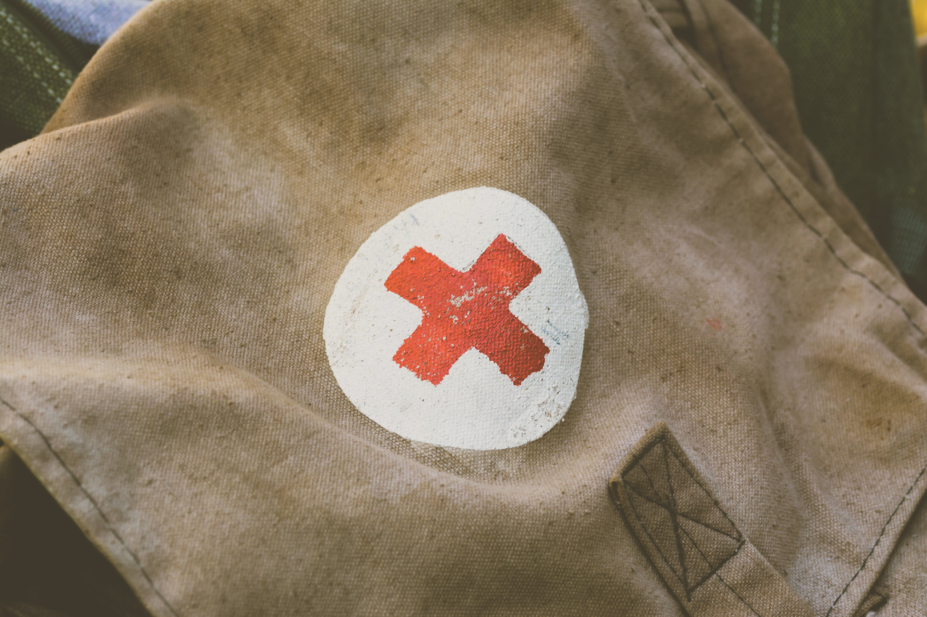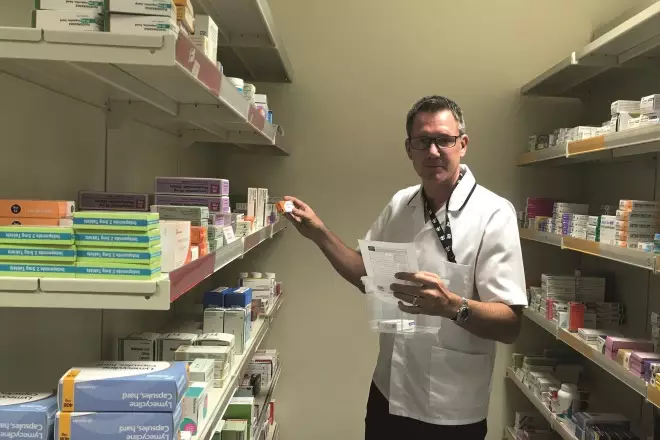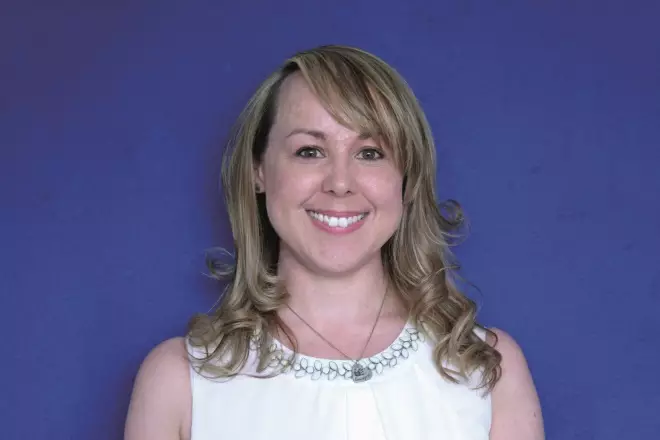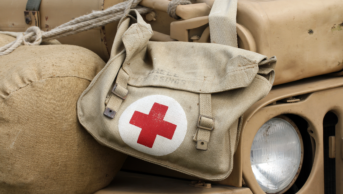
Jacek Wojnarowski / Alamy Stock Photo
The Defence Medical Services (DMS) encompass the entire medical, dental, nursing, allied health, paramedical and support personnel who together work to promote, protect and restore the health of the defence population. Pharmacists and pharmacy technicians make up a vital part of the service and play an essential role in ensuring individuals are fit and healthy to fulfil their roles.
Currently, the DMS provides healthcare to more than 159,630 regular forces personnel — and in some circumstances their dependents and entitled civilians — both in the UK and overseas.
Health and care services are delivered by defence primary healthcare (DPHC) in medical and dental centres, as well as in regional rehabilitation units (RRUs). There are 14 RRUs across the UK and Germany as well as four defence medical group units within NHS Trusts. Other centres include the Royal Centre for Defence Medicine (RCDM) in Birmingham; the Defence Medical Rehabilitation Centre (DMRC) in Surrey; and 11 military-run departments of community mental health (DCMH) as well as four mental health teams (MHT) in the UK. There is also one DCMH base overseas.
A job like no other
The DMS can offer pharmacists and technicians a job like no other with opportunities for ongoing training, and an “excellent” work–life balance. Box 1 summarises the various roles.
Mark Anderson, pharmacy technician for DPHC, spent 25 years as a uniformed member of the Royal Navy. He transferred to a civilian role as dispensary manager a year ago and now manages all dispensing services including medicines management and optimisation, procurement and supply, consultation, and training. Anderson says the role offers a fantastic work–life balance and a unique atmosphere where time is set aside each week for staff training. This gives dispensary staff a chance to work on continued professional development (CPD) and quality improvement projects. Anderson adds, “the work week finishes at midday on Friday so I feel refreshed every Monday!”

Courtesy of Mark Anderson
Mark Anderson says a role in the DMS offers a fantastic work / life balance and a unique atmosphere
Box 1: Pharmacy roles in the defence medical services
A variety of roles exist for both pharmacists and pharmacy technicians in the DMS.
Pharmacist roles:
- Military chief pharmacist: based at Headquarters Surgeon General, the strategic headquarters at DMS Whittington. Provides strategic leadership, direction and education on medicines optimisation to ensure high quality, cost-effective prescribing.
- Deputy chief pharmacist: works alongside the military chief pharmacist focusing on the clinical aspects of medicines optimisation in defence.
- Lead pharmacist DPHC: provides leadership and direction on the delivery of high quality medicines optimisation services. The role is similar to the head of medicines management pharmacist working in a clinical commissioning group (CCG).
- Responsible person: works in the commercial and management organisation, the supply agency for the DMS.
- Officer commanding: operates in the department of pharmacy and medical supply (DPMS) and is responsible for training healthcare personnel on all aspects of pharmacy and medical supply in the Ministry of Defence (MoD).
- Air command pharmacist: provides leadership and direction for medicines optimisation services in the RAF.
- Navy command pharmacist: provides leadership and direction for medicines optimisation services in the Navy.
- Regional pharmacist in defence primary healthcare (DPHC): works in a similar way to locality prescribing advisors in CCGs, providing guidance and support on medicines optimisation services in DPHC.
- Clinical pharmacist at defence medical rehabilitation centre (DMRC): provides a clinical pharmacy service to the DMRC, a tertiary care centre providing healthcare and rehabilitation facilities to service personnel. The service is similar to one of a secondary care trust, but on a smaller scale.
Pharmacy technician roles:
- Medicines management technician: supports the chief and deputy chief pharmacist.
- Regional pharmacy technician: supports the regional pharmacist.
- Pharmacy technician (DPHC): based in DPHC dispensaries in medical treatment facilities.
- Pharmacy technician lecturer (DPMS): at the department of pharmacy and medical supply.
- Pharmacy technician (DMRC).
Training
Helena Pickin, deputy chief pharmacist and National Institute for Health and Care Excellence (NICE) medicines and prescribing associate says, “the Ministry of Defence (MoD) is very supportive of professional development, providing a large variety of clinical and non-clinical training including travel medicine, clinical and prescribing qualifications, and leadership or management training”.

Courtesy of Helena Pickin
Entering the DMS as a civilian has its challenges but it is immensely rewarding says Helena Pickin
Mandatory training for all defence personnel includes fire awareness, health and safety, security and government classifications and where necessary, use of clinical systems.
Regional pharmacist Anuj Sunder entered the DMS in 2015. As a captain in the army reserve (Royal Army Medical Corps) he was scheduled for deployment to Sierra Leone during the Ebola crisis but was de-mobilised and transferred to the pharmacy team at Headquarters Surgeon General where he found out about the role. Sunder states a career in the DMS offers “more opportunities compared with the traditional pharmacy sector to attend courses required for your role, such as Patient Group Directions training.”
Pharmacy technician Lisa Landon agrees, “there are plenty of opportunities to develop in the DMS by attending conferences and completing training both internally and externally, such as Healthcare Clinical Governance.” Landon states these opportunities have helped support the specifications of her role, which involves analysing prescribing data to identify patterns and significant events, and research evidence-based practice to create policies, such as the Defence Primary Care Formulary.
Landon affirms she has been offered training in any area where she needs to develop her skill set, and Roohi Mehra, commanding officer, has found the vast amount of training courses offered are “one of the organisation’s strengths.”
Further opportunities for development include the DMS Pharmacy conference, held at DMS Whittington each year. It is well attended by pharmacists and pharmacy technicians, both civilians and military. It provides an opportunity for networking and CPD with a variety of topics covered such as asthma, pain management and diabetes, as well as activities which promote team work, consultation skills and updates on military operations.
Challenges
Each role in the DMS has its own challenges. Mehra believes the main departmental challenge is understaffing. She adds, “another challenge for a civilian is entering an organisation which communicates predominantly in military jargon.” Landon often encounters attitudes resistant to change, delaying implementation of new, smarter, evidence-based methods of delivering patient-centred care that provide assurance that personnel are medically fit for deployment.
Sunder states that moving from the NHS to the DMS has not streamlined his remit. “This role is vast and focuses on risk management, audit, pharmacy incident management and medicines information.
“I have to ensure medical facilities within all military bases (Navy, Army or RAF) are following correct policy and procedures on par with current national medicines management and optimisation focus,” he says.
Anderson finds that although there is access to a regional or command pharmacist it can be daunting being asked for medicines information in a busy practice but this has helped him determine his clinical boundaries. Anderson adds that there are certain limitations in terms of career progression despite the starting band and pay being attractive.
Pharmacy technician for DPHC, Amanda French explains the problem with progression is that the banding of posts is set. “It would be beneficial for pharmacy technicians to become accredited checkers, which I know is on the agenda for training, but difficult to get started in practice”. She adds, “As a civilian, it is not always easy to be recognised or heard in a military led environment — our voice can be lost.” This has improved gradually with the growing numbers of civilian pharmacists and pharmacy technicians forming a network of support. While it can be frustrating, French says she loves her job and feels able to provide good quality service to patients as her role has grown and developed.
Getting involved
Most DMS pharmacy roles are based in a primary care environment and require relevant experience. The majority of pharmacists are Agenda for Change (AFC) band 8a or above. That is why a postgraduate diploma or higher degree in clinical pharmacy or subject related to medicines management is essential.
Joining the DMS can be a steep learning curve says Pickin. But, she says, “Although the job has its challenges, it is also immensely rewarding”.
Useful information:
More information on civilian roles and current vacancies can be found on the Civil Service website.
Reading this article counts towards your CPD
You can use the following forms to record your learning and action points from this article from Pharmaceutical Journal Publications.
Your CPD module results are stored against your account here at The Pharmaceutical Journal. You must be registered and logged into the site to do this. To review your module results, go to the ‘My Account’ tab and then ‘My CPD’.
Any training, learning or development activities that you undertake for CPD can also be recorded as evidence as part of your RPS Faculty practice-based portfolio when preparing for Faculty membership. To start your RPS Faculty journey today, access the portfolio and tools at www.rpharms.com/Faculty
If your learning was planned in advance, please click:
If your learning was spontaneous, please click:


